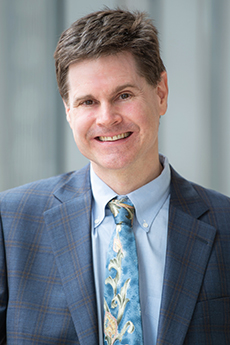Dr. Matthew Kay of the biomedical engineering department and Dr. David Mendelowitz of the School of Medicine and Health Sciences (SMHS) are the Multiple Principal Investigators on a newly awarded four-year, $2.33 million R01 grant from the National Institutes of Health’s National Heart, Lung, and Blood Institute. Their project, “Novel Mechanisms that Restore Cardiac Parasympathetic Activity Limit Arrhythmias and Cardiac Dysfunction After Myocardial Infarction,” will study how to control the cardiac parasympathetic neural system to protect the heart from damage.
“Activation of the sympathetic nervous systems provides short term benefits to improve cardiac function but during disease, the sympathetic nervous system is ‘on’ all the time, and at high levels, and this is harmful because it creates a state of chronic stress on the heart and the body,” Kay explains. “By activating the parasympathetic nervous system during heart failure, myocardial infarction, and sleep apnea, we are able to reduce inflammation, improve beneficial metabolic processes, and limit cell death during the disease. The heart is healthier. I like to think that we are re-balancing the autonomic system during disease to a more healthy level.”
Drs. Kay and Mendelowitz have worked together on other research projects and, in fact, are the recipients of two other current NIH R01 grants also focused on high-tech neurocardiology and heart disease. “My expertise in cardiac electrophysiology and metabolism and [Dr. Mendelowitz’s] expertise in the cardiac autonomic pathways of the brainstem have beautifully synergized to provide a unique cross-disciplinary strength in neurocardiology research at GW,” Kay says.
On this most recent project, they are working with an outstanding cross-disciplinary team of GW investigators that comprises the biomedical engineering department’s Dr. Kate Schunke, Dr. Christopher Spurney of Children's National Hospital, and Dr. Olga Dergacheva and Dr. Jhansi Dyavanapalli, both of SMHS. Kay values this opportunity for cross-departmental collaboration with GW researchers, noting, “I am working with fantastic trainees and like-minded colleagues at GW who all value high-caliber, rigorous science, and collegial teamwork that is supportive of everyone involved.”
Kay greatly enjoys the real-world applications of his research. “For me, an appealing aspect of all of our projects is that we are working on cutting-edge science, using cutting-edge tools, to address major cardiovascular diseases that affect many Americans, which is particularly important as the population ages. [Dr. Mendelowitz] and I and our clinical collaborators are all intimately involved in the details of each experiment and analysis of the results, and it is exciting to be a part of that.”


